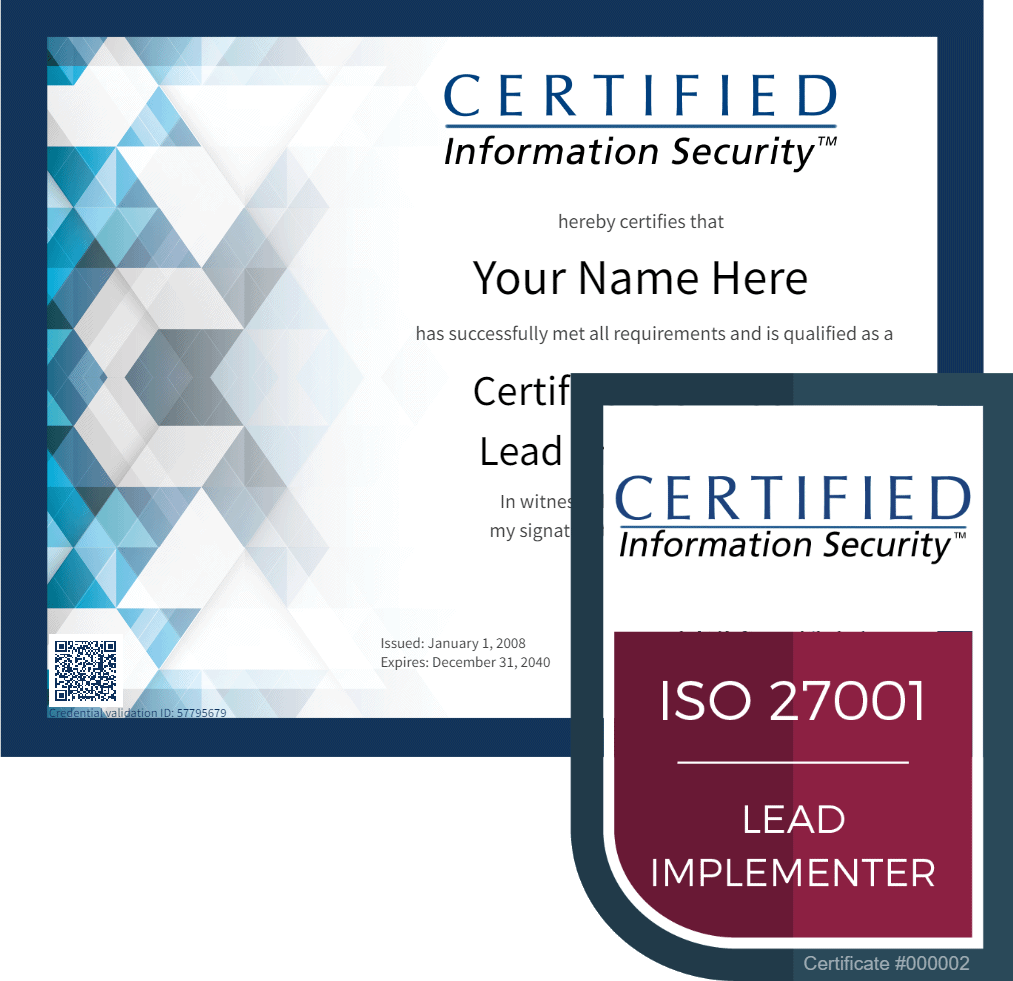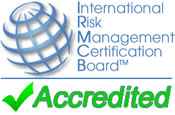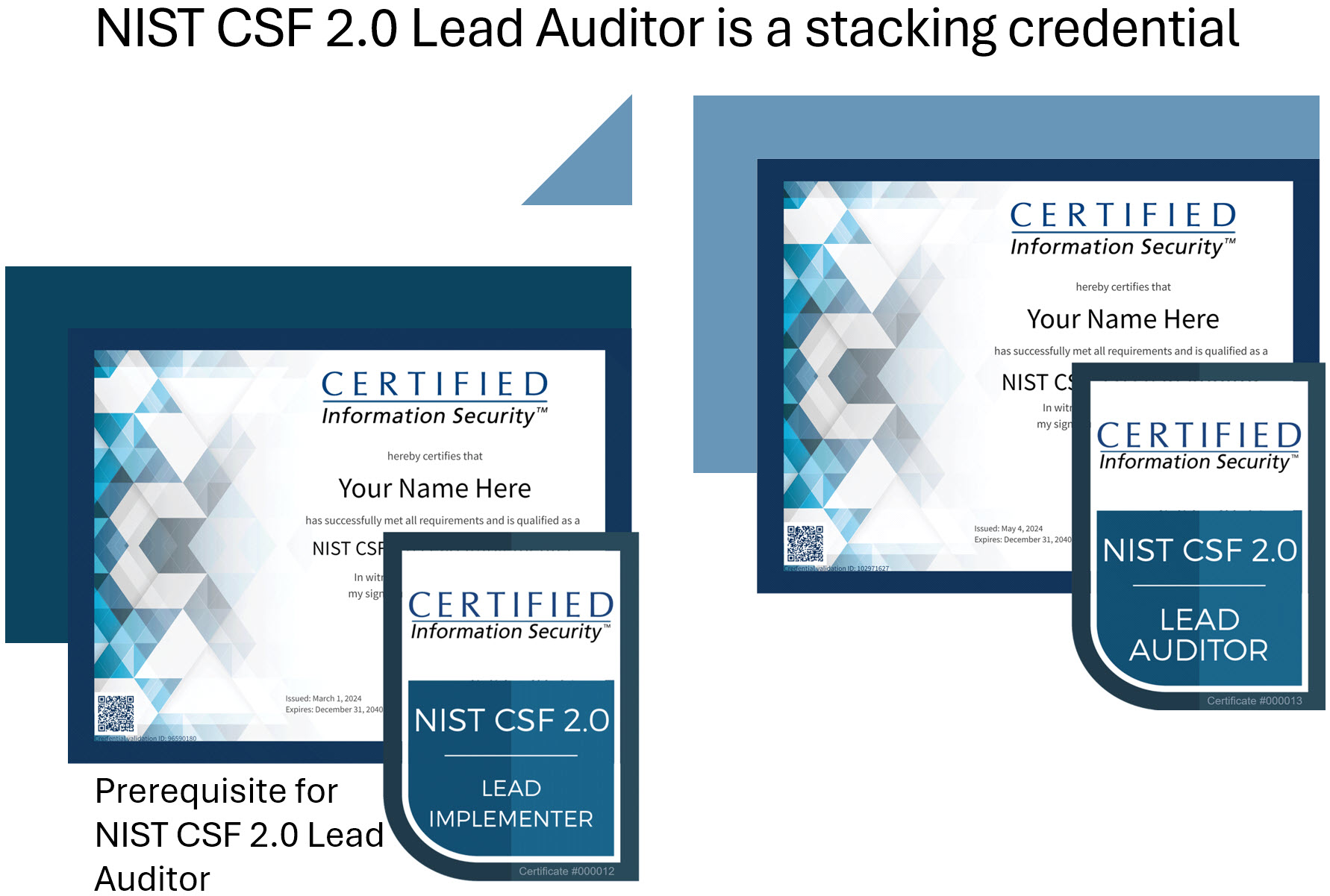ISO 27001 Lead Auditor Implementer Training
ISO 27001 Lead Implementer Auditor Training


information security management program
your stakeholders can believe in.
Establish, govern, and operate ISO 27001-based information security management
to ensure your organization effectively protects information confidentiality, integrity, and availability.
Get certified by ISO, and the organization will have credible and respected validation of due care and diligence.
Get a thorough understanding of ISO 27000 standards for information security governance, and how to leverage the ISO 27000 standards to establish and maintain an information security management system (ISMS) program.
Build-out the initial ISO-conforming information security program policy right in class!
ISO 27001 specifies the requirements for establishing, implementing, operating, monitoring, reviewing, maintaining and improving a documented Information Security program within the context of the organization's overall business risks. It specifies requirements for the implementation of security controls customized to the needs of individual organizations.
Designed to follow our 3-day ISO 31000 Enterprise Risk Management program, this 2-day ISO 27001 training and certification workshop continues our information security risk assessment training to provide thorough coverage of the ISO 27000 standards, as well as setting out advice on the implementation of an information security initiative. The purpose of the course is to:
- Describe the principles and processes of information security governance and management;
- Provide thorough coverage of the requirements of ISO 27001;
- Give practical guidance on designing a suitable framework;
- Give practical advice on implementing information security management;
- Prepare you for your ISO 27001 certification exams required for professional credentialing.
- Establish a firm program starting point by using ISO 27001, ISO 27002, and 27003 to build out the initial Information Security Management core policy. Soft-copy editable templates are provided in class:
- Complete ISO 27001-conforming Information Security System Policy (15-Page template provided)
- Procedure document for Training and Development Needs Analysis (9-Page template provided)
- Kick-off ISMS project plan (9-Page template provided)
- Procedure document for Identification of Requirements (4-Page template provided)
- Procedure document for identification of statutory, regulatory, contractual, and other requirements (1-Page template provided)
Class details
- Duration: 2 days, 8:30 - 4:30
- CPE Credit: 16
- Materials included with live instructor-led training:
- Class manual (complete hardcopy of class presentation)
- Hardcopy policy templates
- Softcopy policy templates
- 14 days of unlimited access to online practice exams for exam #ISMS101
- 1 attempt for the online certification exam #ISMS101
- Current-year membership in the CIS Body of Certified Professionals

-

- Professional Certification: This course fulfills prerequisite training requirements for certification exam #ISMS101 for professional ISO credentials including ISO 27001 Lead Implementer, ISO 27001 CICA, and ISO 27001 Lead Auditor.
- Certificate included with class: Upon course completion, we will provide you with an achievement certificate for 16 continuing professional education (CPE) credits that can be used to fulfill requirements for maintaining a variety of professional credentials for fraud examination, accounting, auditing, and information security.
- Recommended prerequisite training: CIS Policy Workshop: ISO 31000 Enterprise Risk Management
- Catering:
- Morning refreshments and snack, lunch, afternoon refreshments
- Hotel and/or Travel: Not included
| * ISO Standards are NOT included in this risk management training, nor provided in class. ISO standards are available for purchase at www.iso.org. |


 Certified Information Security provides the training and credentialing you need to become recognized as an authority in information security governance and risk management. You choose the method of delivery: online through our secure website, or in-person at a publicly available course or privately at your facility. We take care of the rest – from administration, to record keeping, to providing certificates of completion and certification.
Certified Information Security provides the training and credentialing you need to become recognized as an authority in information security governance and risk management. You choose the method of delivery: online through our secure website, or in-person at a publicly available course or privately at your facility. We take care of the rest – from administration, to record keeping, to providing certificates of completion and certification.
















